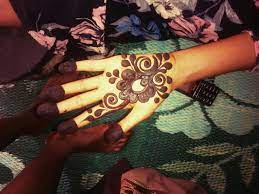When one thinks about the wedding/events management industry in Nigeria, they think of specific vendors: George Okoro, Deola Segoe, Chimera events company, Rosa Clara, Hermosaa, among others. One hardly hears about the Arewa (Northern) Nigerian female vendor attending to the newlyweds and contributing to make their day as special as it can be. For this piece, LEADERSHIP Weekend spoke with young, female Arewa entrepreneurs in wedding/events management about their jobs and the importance of taking up such unconventional roles in their societies.
Tasneem Galadanchi is a 25-year-old freelance make-up artist from Kano State with a Bachelor’s degree in Business Administration. About a year ago, she noticed the endless possibilities and flexibility being a make-up artist offers and having already identified the talent within, she decided to use it “to achieve something for herself.”
Galadanchi told LEADERSHIP Weekend that it was “surprisingly easy” when she started. Even though she knew the demand was high, she also knew it was a competitive business, as there were so many make-up artists in Kano, most of whom were very talented. “These days, everyone is crazy about make-up and looking for a good make-up artist,” she explained, making her entrance into the industry easier than she thought it would be. She attributed her smooth sailing entrance to her talents and abilities. “I have so much to give and I’m very good at what I do,” she said. “I just want to put out my gift to the world and what I have to offer.” Because of her dedication, talent and the high demand for make-up artists in Kano, she told LEADERSHIP Weekend that she had not faced any challenges since she started.
Galadanchi’s make-up business is very important to her; it is her security. “There are very little job opportunities in Nigeria and almost none for women and even worse for Arewa women because we are expected to not get higher education. We are mostly brought up to see marriage as the ambition and when marriage doesn’t work out, the woman is left at risk and vulnerable because she wasn’t given the proper tools or education to protect and fend for herself,” she stated. Therefore, she feels safe running her business, having something to do and having her own money.
“The reward for discipline and hard work has definitely improved my mind and my sense of self. I believe other Arewa women who work for what they have can relate. We are far from lazy,” Galadanchi said.
In the near future, she hopes to help other Arewa women start their own make-up businesses and run their own beauty companies, and also create a network through which women can hire and collaborate with other like-minded women in the industry.
Like Galadanchi, Fatahiyyah Imran Jibrin, a 27-year-old photographer from Nasarawa State, is also in wedding planning/management and has been in the trade for seven years. “We lack female Arewa photographers,” she told LEADERSHIP Weekend, explaining that it started as a hobby and with the encouragement of her family, turned it into a business. Despite the fact that she faced some challenges – like Arewa people opting for more popular photographers – she said the journey has been “smooth sailing” as many clients prefer female photographers “so they can be free” when having a photoshoot or an event. With weddings, many of the events are females-only, which has increased the demand for female photographers, giving more opportunities for Jubrin.
Another female Arewa entrepreneur in the industry is Habiba Manzo, a 28-year-old from Wushishi in Niger State who holds a Bachelor’s degree in Entrepreneurship and Business Management. Having been in the business for six years now, she told LEADERSHIP Weekend that she has always had a flair for putting things in order and was also inspired by “the satisfaction from making people’s big day (wedding) memorable.” In addition to this, she had also never met an Arewa wedding planner, which prompted her to start her business.
Understandably, getting into the business and “into the circle” was challenging at first. But Manzo realized she did not need to do that; “the right ones will eventually come along, and they sure did”. She built a relationship with vendors she works with, and it has been a “blissful” experience thus far.
When she first started, she would get “passive snide comments” about her age and ethnicity; people assumed Northerners didn’t know how to party and thus, would not be able to get the job done. When she was not hearing that Northern women were “brats” from non-Northerners, she was listening to Northern relatives criticise her job. They would tell her that events planning was not a real job, that it didn’t “work well with our traditions or culture” and that she, as an Arewa lady, would be “over-exposed”. “All that has come to pass, though,” she told LEADERSHIP Weekend. “I believe I’ve delivered enough jobs that have proven my capability and it’s only gotten better. My referrals speak for my work.”
She believes that being an Arewa woman gives her an advantage in the industry, especially when planning Arewa weddings. “There are values that people can’t really learn, comprehend or eventually infuse into your wedding, except you’re one of them,” she explained. Her business, she said, also gives back to the Arewa community by supporting “up and coming” businesses from the region.
In her view, she believes it is important for Arewa women to have businesses for self-sufficiency. “For me, before anything else, I think of myself and what I want and not what society thinks or expects from me – that is secondary.” Manzo feels the need to have, build, stand strong and inspire. Her work is a testament to how hardworking and enterprising Arewa women are – even in an industry that seems farfetched from cultural expectations and norms.
Female Arewa entrepreneurs have thrived in many industries – be it healthcare, entertainment, restaurants, agriculture, etc – but because of opinions like “you’ll be over exposed”, you hardly find many of them in the wedding industry. But this opinion has long been thrown away and young, female Arewa entrepreneurs are out learning skills and making a name for themselves in whichever industry they wish.
A common opinion or stereotype about Arewa (Northern) Nigerian women is that they are lazy women who remain financially dependent on their husbands. What is often ignored is the fact that there are – and have always been – successful female Arewa entrepreneurs. The popular Pink Fleur brand, for example, which has been garnered over 100 thousand followers on Instagram, was founded by Zainab Salihijo Ahmad from Adamawa State. Zainab, who has a degree in Biotechnology and over 5 years of work experience in public health, is passionate about fashion. She has taken numerous fashion courses (including fashion design, business of fashion and luxury fashion), some of which were at the prestigious London School of Fashion and for the past 10 years, has been a fashion entrepreneur in Abuja with her ready-to-wear business among the most popular and successful in the industry across the country.
Zainab started her business after her National Youth Service Corps (NYSC). She saved up her NYSC allowance to buy her first machine and hired her first tailor, working from a garage in Gwarimpa, Abuja. The business started like many others, Zainab told LEADERSHIP Weekend that she sewed 10 wedding outfits for her friend and took a few samples to the event, all of which sold out there and then. When she started, there weren’t many ready-to-wear fashion brands (at least, not that she knew of); she had two or three competitors, and neither was owned or run by an Arewa woman. The demand for ready-to-wear outfits, however, was there and the increase in supply only inspired people to buy from her.
As an Arewa woman, she found that people hardly take her seriously as a fashion entrepreneur. “She’s a tailor,” people would say, and assume there was no potential growth in the industry. This made it hard to find funding to grow the business. Finding people who would understand your dream, see the growth potential of your business, and fund it was challenging, Zainab said.
In addition, getting funding as a “tailor” has proven to be very difficult. She is currently trying to open a factory that would manufacture clothes in bulk but it has been difficult as it requires a lot of capital in terms of land and funding. If she can overcome this challenge, she would be able to increase her supply and cater to not only the Nigerian market, but the international market as well. When it comes to funding, she said, “people don’t prioritize small businesses like fashion design. They would rather invest in agriculture or Filtex or technology companies.” This was particularly challenging, especially because she wanted to grow Pink Fleur into something phenomenon, something amazing, something big. And despite all the challenges, she has done tremendously well in the last decade. “Today, we have 29 staff at Pink Fleur and we’re able to create jobs in the Nigerian market and make a difference in people’s lives,” she told Leadership.
“I think it is important, as an Arewa woman, to have a business – so you can be financial free and be able to have your own money and do with it as your please,” she told LEADERSHIP Weekend. She spoke about the rising rate of unemployment across Nigeria and the importance of learning a skill while in school so one can start a business and sustain themselves by having different sources of income. “I think it is important for me, as an Arewa woman, to be in this industry so that we can show our culture, be able to create pieces that would describe the Arewa woman. At Pink Fleur, we use a lot of items that are classic in Arewa fashion and try to innovate them.” When she sells outfits to women in the United States or South Korea, she feels like she is giving “a bit of Arewa woman” to the world, like she is presenting the culture in different parts of the world, which she loves to do.
Zainab is giving back to the Arewa community by creating jobs for youths to be models, content creators, managers, salespeople, and tailors, and is also helping to solve Nigeria’s unemployment problem by opening the positions to people from different parts of Nigeria.
She’s also able to inspire Arewa women to start their own businesses, as they can see someone like them in business. “I think it’s important to have a lot of people like us out there, so we feel like we can do it.” Zainab gets a lot of calls from people seeking her advice and she is happy to share because when she was starting her business, she didn’t have anyone who could help. She later started “Style Scenery” and “Pink Fleur Fashion Talk” to advise women in the industry to understand how to grow their business beyond the creativity – how to do their books, accounting, who to hire, when to hire, how to manage your business, etc.
“I encourage Arewa women to get into businesses and I tell them why it is important to be financially free and not be lazy and know that they can do it. I also tell people I mentor that you need to be consistent and keep doing what you’re doing for a long time. Don’t give up,” she stated. “I’m happy to see that a lot of women are doing businesses now. I think, in Nigeria, more than 50 per cent of SMEs are owned by women, which is really nice to hear because we understand the value we bring to the market and also understand that it’s good to have your own money and not depend on whatever your husband gives you.”
Another female Arewa entrepreneur seeking independence is 27-year-old Sauda Ahmed from Kano State, who has a Master’s degree in Financial Management. Sauda started Snakk – an 8-month-old business selling Arewa drinks in Lagos, Nigeria – after realising the lack of Arewa drinks in her immediate community and that the few vendors selling them were not from Arewa. “One way of changing the stereotype is to show other Arewa women that they can get into the business sector and actually be successful, have something going on for themselves and be independent outside of their marriage,” she said. Therefore, the more Arewa women come out to prove this, the more other women will have an incentive to start their own business.”
When she first started her business, Snakk, she didn’t find it difficult to penetrate the market at all. Although it was a new business, the demand was high; zobo, for example, is a drink made from hibiscus leaves which has many health benefits.
Snakk is important to her as an Arewa woman, as it allows her to be independent, experienced, and opens new doors. Ahmed hopes to inspire Arewa women to do the same and start businesses they would enjoy, whether it is tailoring, baking, or opening hair salons or restaurants. “It’s important for me, as an Arewa woman, to be in this industry,” she emphasised. “I also want – as an Arewa woman – to push for my culture, represent my culture and make this drink modern, as zobo is versatile and can be taken and presented in so many different ways.”
Given that Snakk is a small business, they have not started employing people yet. But in the nearest future, Ahmed hopes to employ more Arewa youth and them the opportunity to represent the culture.
Female Arewa entrepreneurs have existed since the beginning of time – whether it is the story of Nana Khadija, the wife of Prophet Muhammed (S.A.W) who was among the most successful businesswomen of her time, or the old women who sold traditional sweets such as gullisuwa and allawar madara in Sararin Garki at the Kano Emir’s Palace, or the young girls on the streets of Yakasai who fry and sell awara and wainar flour. But because of the lack of social media presence, women and girls are hardly acknowledged and celebrated, hence the stereotype that Arewa women are lazy and dependent on their husbands continues to spread. But in today’s world, there are many young female Arewa entrepreneurs challenging these stereotypes and with the popularity of social media, they are able to change the narrative, create employment and present the new image of the Arewa woman to the world.





